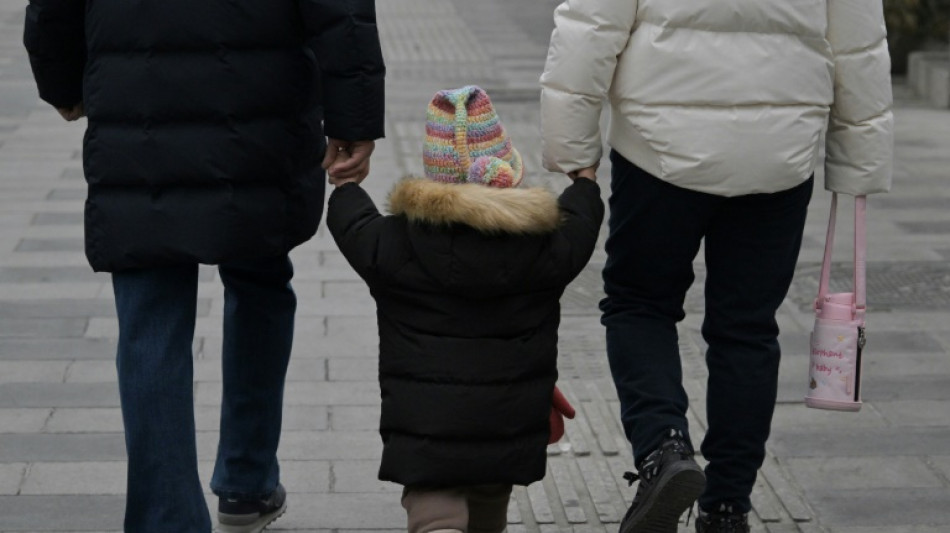
-
 Turkey's opposition says Erdogan's canal plan behind latest arrests
Turkey's opposition says Erdogan's canal plan behind latest arrests
-
Maresca hails 'nasty' Chelsea as top five bid stays alive

-
 Trump raises Putin doubts after Zelensky talks at pope's funeral
Trump raises Putin doubts after Zelensky talks at pope's funeral
-
Major blast at Iran port kills 4, injures hundreds

-
 Napoleon's sword to be sold at auction in Paris
Napoleon's sword to be sold at auction in Paris
-
Iran, US discuss nuclear deal in third round of talks

-
 Buenos Aires farewells native pontiff with call to action
Buenos Aires farewells native pontiff with call to action
-
Warholm sets hurdles world record at Diamond League, Holloway shocked

-
 US students 'race' sperm in reproductive health stunt
US students 'race' sperm in reproductive health stunt
-
Wikileaks founder Assange joins crowds for pope funeral

-
 Leader Marc Marquez claims Spanish MotoGP sprint victory
Leader Marc Marquez claims Spanish MotoGP sprint victory
-
Celtic win fourth successive Scottish Premiership title

-
 Jackson ends drought as Chelsea boost top five push
Jackson ends drought as Chelsea boost top five push
-
Warholm sets 300m hurdles world record in Diamond League opener

-
 Major blast at south Iran port kills 4, injures hundreds
Major blast at south Iran port kills 4, injures hundreds
-
Russia says retook Kursk from Ukraine with North Korean help

-
 Francis laid to rest as 400,000 mourn pope 'with an open heart'
Francis laid to rest as 400,000 mourn pope 'with an open heart'
-
Trump, Zelensky meet on sidelines of pope's funeral

-
 'Shared loss': Filipino Catholics bid Pope Francis farewell
'Shared loss': Filipino Catholics bid Pope Francis farewell
-
Families unable to reunite as India-Pakistan border slams shut
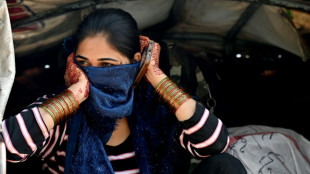
-
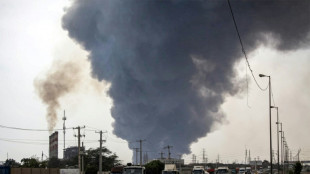 Major blast at south Iran port injures hundreds
Major blast at south Iran port injures hundreds
-
Foreign carmakers strive for 'China Speed' to stay in race
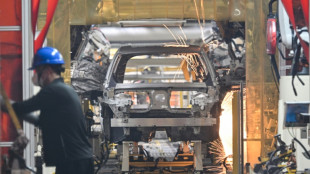
-
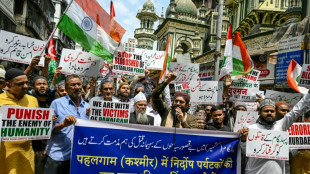 Pakistan says open to neutral probe into Kashmir attack after India threats
Pakistan says open to neutral probe into Kashmir attack after India threats
-
Hundreds of thousands at funeral mourn pope 'with an open heart'

-
 Quartararo sets Spanish MotoGP record to claim pole
Quartararo sets Spanish MotoGP record to claim pole
-
Hamas says open to 5-year Gaza truce, one-time hostages release

-
 Iran, US hold new round of high-stakes nuclear talks
Iran, US hold new round of high-stakes nuclear talks
-
Up at dawn for front-row seat to history at Francis's funeral

-
 Pakistan ready to 'defend sovereignty' after India threats
Pakistan ready to 'defend sovereignty' after India threats
-
Huge crowds flock to Vatican for Pope Francis's funeral

-
 Xi says China must 'overcome' AI chip challenges
Xi says China must 'overcome' AI chip challenges
-
Indian army says new exchange of gunfire with Pakistan

-
 Epstein accuser Virginia Giuffre takes own life in Australia: family
Epstein accuser Virginia Giuffre takes own life in Australia: family
-
Hundreds of buildings damaged, dozens injured in 6.3 Ecuador quake

-
 India and Pakistan's Kashmir fallout hits economy too
India and Pakistan's Kashmir fallout hits economy too
-
Francis's funeral to be grand farewell to 'pope of the poor'

-
 Pogacar faces defiant Evenepoel at Liege-Bastogne-Liege
Pogacar faces defiant Evenepoel at Liege-Bastogne-Liege
-
Chelsea eye great escape against Barcelona in Women's Champions League

-
 Iran, US to hold new round of high-level nuclear talks
Iran, US to hold new round of high-level nuclear talks
-
'Energy and effort' pay off for Reds as Blues' woes continue

-
 Albatross and closing birdie lift China's Liu to LPGA Chevron lead
Albatross and closing birdie lift China's Liu to LPGA Chevron lead
-
On the horizon? Wave of momentum for high seas treaty

-
 New to The Street Launches For The Causes(TM) Monthly Awareness Segments: Offering Free National Media to Charities and Organizations
New to The Street Launches For The Causes(TM) Monthly Awareness Segments: Offering Free National Media to Charities and Organizations
-
Top Mistakes to Avoid When Building Credit History

-
 Developing countries should fast-track US trade deals: World Bank president
Developing countries should fast-track US trade deals: World Bank president
-
Grizzlies' Morant 'doubtful' for must-win game 4 v Thunder

-
 Trump in Rome for pope funeral in first foreign trip of new term
Trump in Rome for pope funeral in first foreign trip of new term
-
Trump says Russia-Ukraine deal 'very close' after new Kremlin talks

-
 US rookies lead PGA pairs event with McIlroy and Lowry in hunt
US rookies lead PGA pairs event with McIlroy and Lowry in hunt
-
Trump tariff promises get a reality check


Money weighs on would-be Chinese parents as population falls
Young Chinese are increasingly hesitant to start families, citing economic concerns exacerbated by rigid social norms around child-rearing, even as their government grows desperate to boost the birth rate and stave off a demographic crisis.
China's population decline accelerated in 2023, official figures released on Wednesday showed, shrinking by more than two million people.
Long alarmed by falling fertility, the government has relaxed its decades-long one-child policy in recent years to allow three children per family, while rolling out subsidies and calling on women to become homemakers.
But the incentives and exhortations are doing little to change what demographers describe as an economic crisis in the making, as the number of working adults shrinks while a booming contingent of retirees chips away at finite social security funds.
Twenty-six-year-old Xiaopeng works at a Shanghai event space that hosts classes and parties for children, but said he prefers his pets to having children of his own.
"For me, children could be a bit more difficult, with all the practical concerns you have to consider," he told AFP.
Childbirth in China usually comes after a wallet-draining process of buying a home, finding a spouse, and paying for a lavish wedding, with government policy penalising births out of wedlock despite recent moves in some regions to support unwed mothers.
Parents then race to ensure their children excel at school and university to succeed in the cut-throat jobs market, feeding a massive afterschool tuition market that the government has cracked down on with limited success.
The average cost in 2019 of raising a child in China from birth to age 18 was 485,000 yuan ($68,000), according to Beijing-based thinktank YuWa Population Research.
That was nearly seven times the country's GDP per capita that year -- a ratio far exceeding the United States' 4.11 or Australia's 2.08.
That does not include the apartment that parents are often expected to help sons buy to secure a bride.
"For my friends, if they have a stable job and their careers are stable... they will start to want children," Xiaopeng said.
"For me, I feel like raising pets is more appropriate than raising a child."
- 'No marriage, no kids' -
"The younger generation has fundamentally changed its conception of fertility and is generally unwilling to have more children," He Yafu, an independent Chinese demographer, told AFP.
Growing numbers of young adults proudly flaunt their childfree lifestyles on social media.
"No marriage, no kids" is a popular topic on the Chinese pop culture website Douban, with thousands of users exchanging views and seeking reassurance on their childfree lifestyles.
"Can you really sacrifice so much just to hear someone call you 'mama'?" one asked recently.
Cao, a mother-of-one in her thirties from the western city of Xi'an, said a lot of her friends were "DINKs", an acronym for couples with double incomes and no kids.
She cited economic concerns as a reason people hesitated to have children.
"Before you have a child you have to think about educating them, and people definitely want their children to go to better schools," she told AFP.
While public education fees are relatively affordable in China, prestigious schools prioritise admission for children living nearby, resulting in sky-high prices for cramped, outdated accommodation in areas near sought-after schools.
- Women's work -
Unlike many, Cao, who asked to be identified only by her surname, said she can count on substantial childcare help from her husband.
In 2021, 63.7 percent of Chinese children under the age of three were cared for primarily by their mothers during the day, according to a UN report.
Working women spent double the amount of time men did caring for family members.
Despite scattered government efforts to increase fathers' involvement in child-rearing, the national paternity leave allowance is around two weeks -- measly compared to around three months for new mothers.
Xiaopeng said that at his workplace he sees mainly women accompanying their children.
Visiting a hospital in Shanghai with her husband, 28-year-old Xiang, who is expecting her first child, said being pregnant was "exhausting".
She is considering hiring a confinement nanny or even moving into a specialised hotel after giving birth, during the traditional 30-day period when new mothers are expected to receive special meals and care -- a custom that can cost tens of thousands of dollars for each birth.
She believes most young people are "comprehensively" weighing the cost of childcare before having babies.
"You can't just say you are having a child and then do it... the process of raising a child requires huge support in terms of mental effort and finances."
P.Stevenson--AMWN



